Turning 70 is a big deal for most people, and especially so for Philip Glass, whose birthday is being celebrated worldwide big time. He’s just been feted in New York by Music At The Anthology (MATA), and Groningen, Holland, is putting on a Glass Festival. The composer and The Philip Glass Ensemble performed his massive compendium of minimalist moves, Music in 12 Parts (1971-74), this summer in the Hague and the San Francisco Bay Area pays its homage with the world premiere of his SF Opera commission, Appomattox, this coming Friday, October 5.
Glass is such a big name, and pervasive influence–I caught a chord progression in a dance mix lifted straight from him in a bar–that it’s almost hard to see the trees for the forest. But Glass emerged clearly from that penumbral place in Philip Glass: An Evening of Chamber Music, which kicked off San Francisco Performances’ season at Herbst Theatre on Friday night. And all the frenzied Zeitgeist schtick on Van Ness– couples out on first — will there be a second?– dates, bobbing heads on cell phones, opera patrons running to catch the curtain, and monster traffic–was happily left outside.
Glass, mike in hand, (“is it me, or the machine?) began by announcing a program change. He’d begin with 4 sections of the 5-part Metamorphosis (1988), for solo piano, and not play either of the 2 Etudes (1994) planned. Metamorphosis, though it uses material from the composer’s score to Errol Morris’ doc The Thin Blue Line (1988), takes its title from the Kafka short story of the same name, for which Glass wrote scores for concurrent theater productions in Brazil and the Netherlands. And though the music stands proudly on its own, its lines and harmonies suggest the haunted atmosphere of Kafka’s tale–Gregor Samsa’s alienation from the world, and his dogged journey to a kind of transcendence.
And Glass, sitting erect at his Steinway concert grand Model D, brought its many beauties to light–the poignant hesitations in #1 struck the heart, he made the massive floating harmonies in #2 acutely affecting through discreet pedalling, his attacks gave the bell-like paralllel chords of #3 power, and his command of color gave #4 its dramatic weight. Glass has spoken of his drifting sense of meter, and this was certainly apparent throughout; pianists like Alec Karis and Michael Riesman would surely have been metronomically regular. Metamorphosis has sometimes been described as Satie-like, though the equally private worlds of Schubert’s Impromptus and Brahms’ Intermezzi, come strongly to mind. My first encounter with Metamorphosis live was when Glass played the entire set ,as Molissa Fenley danced, at The Unitarian Church, which is a little more than a stone’s throw from Herbst. But what sticks most is how the music the composer has written in the intervening years has colored his gestures when he plays this piece now.
Next came the West Coast premiere of Songs and Poems for Cello, which Glass wrote for NY-based new music star Wendy Sutter of Bang On A Can fame, who plays a wide range of works from uptown –actually West Village people like Elliott Carter–to downtown composers. This is a thoroughly demanding piece, which Sutter played from memory, and which, with its sense of duende–Lorca”s term for anything springing from deep within– seemed to evoke music as various as Bach, bits of the Suites for Cello (BWV 1007-12), and Brandenburg 6 (1721), as well as Ravel’s Sonata for Violin and Cello (1920-22), and Dohnanyi’s Cello Sonata (1899), which Martha Graham choreographed as Lamentation, without ever resembling any of these. Its seven sections–applause broke out in one–were mostly grave, intense, deeply sonorous, and completely lacking in easy effects. Sutter negotiated its myriad technical–long sustained lines, double-stopping, pizzicati, and focus on different registers, usually sequentially–and expressive difficulties with almost superhuman ease.
Four interconnecting episodes, or “Tissues”, from Godfrey Reggio’s third and final installment in the QATSI trilogy, Naqoyqatsi (2002), scored here for Glass, piano, Sutter, cello, and PGE percussionist Mick Rossi, followed. One was struck by the cello writing’s resemblance to that in Songs and Poems for Cello, the ultra soft sounds from the keyboard, and the floating sounds Rossi achieved on marimba and celeste. Naqoyqatsi never got the attention it deserved in its initial theatrical release, though Glass’ tour with his ensemble here last year–the film and score were performed by him and his PGE live at Davies–helped to right that wrong.
Equally atmospheric were the last two offerings–The Orchard, a kind of slow sarabande from Glass’ score for JoAnne Akalitis’ 1991 theatre production of Genet’s The Screens, transcribed here for piano, cello, and percussion, from its original incarnation for flute, clarinet, piano, percussion and cello, and Closing, from Glass’ 1981 record debut on CBS, Glassworks, misunderstood as a pop/crossover piece then, and probably now as well, which Glass and his two fellow musicians played with both point and affection. “How can such a quiet person write such powerful music?” I said to my companion, who sat stock still, hands folded, throughout. Who knows? But this concert proved beyond the slightest doubt that Glass has always been and remains a chamber musician intent on speaking to his listeners in the most intimate terms. Appomattox, which struck this listener as almost unbearably intimate, when he heard most of its first act at a Sitz-Probe 2 September, will likely fall into this exalted class
 The
The 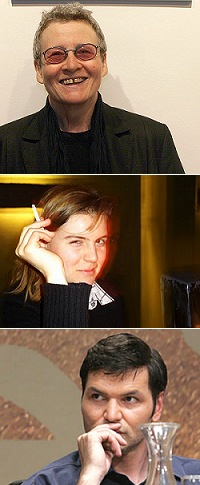 Liesl Ujvary (1939-, Pressburg/Slovakia) moved to Austria in 1945 and spent her childhood in Lower Austria and Tyrol. She studied Slavonic, old-Hebrew literature and art history in Vienna and Zurich. After some visits in Moscow she finished her dissertation on Ilja Ehrenburg’s ‘Julio Jurenito’ at the University in Zurich in 1968. She held a university teaching position for Russian language and literature at the Sophia University in Tokyo, and lives as a writer in Vienna since 1971.
Liesl Ujvary (1939-, Pressburg/Slovakia) moved to Austria in 1945 and spent her childhood in Lower Austria and Tyrol. She studied Slavonic, old-Hebrew literature and art history in Vienna and Zurich. After some visits in Moscow she finished her dissertation on Ilja Ehrenburg’s ‘Julio Jurenito’ at the University in Zurich in 1968. She held a university teaching position for Russian language and literature at the Sophia University in Tokyo, and lives as a writer in Vienna since 1971.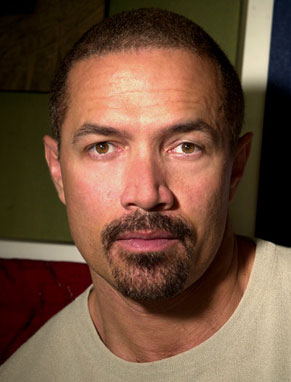 “Music should either touch your soul or make you dance,” Michael Abels says, and though he admits there is a lot of music out there that doesn’t do either, those should be the goals. “I always ask my students ‘what is the purpose of your music?’ You can’t create it unless you know what you want it to do.”
“Music should either touch your soul or make you dance,” Michael Abels says, and though he admits there is a lot of music out there that doesn’t do either, those should be the goals. “I always ask my students ‘what is the purpose of your music?’ You can’t create it unless you know what you want it to do.”
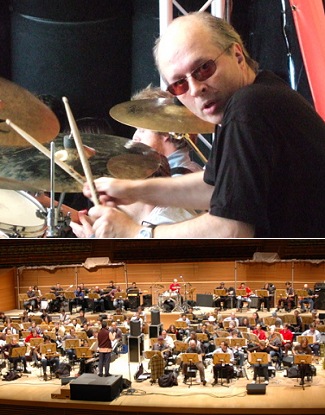 With not only an M.F.A. and Ph.D. in composition from Princeton, but a B.A. and an M.A. in Comparative Literature from Columbia (with a bit of Juilliard thrown in), you might expect some “high-concept” mixing with the music in Virgil Moorefield’s work, and so there is. But Virgil has a powerful weapon for keeping that ivory tower from becoming a tomb: he’s also a drummer. Not just any drummer, either; that’s him in the upper-center of the lower photo, the one-man motor driving Glenn Branca’s 100 guitars in Branca’s Symphony #13, “Hallucination City” (in a pic from the 2006 L.A. performance), a role he’ll be reprising when the symphony is done again this Oct. 12th at
With not only an M.F.A. and Ph.D. in composition from Princeton, but a B.A. and an M.A. in Comparative Literature from Columbia (with a bit of Juilliard thrown in), you might expect some “high-concept” mixing with the music in Virgil Moorefield’s work, and so there is. But Virgil has a powerful weapon for keeping that ivory tower from becoming a tomb: he’s also a drummer. Not just any drummer, either; that’s him in the upper-center of the lower photo, the one-man motor driving Glenn Branca’s 100 guitars in Branca’s Symphony #13, “Hallucination City” (in a pic from the 2006 L.A. performance), a role he’ll be reprising when the symphony is done again this Oct. 12th at 
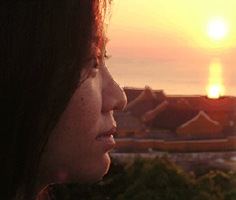 Official blurb: “A native of Shenyang, Fuhong learned to play the piano at the age of eight, and began to study composition at fourteen. She graduated from the music school affiliated with the Shenyang Conservatory of Music in 1995, where she received the highest entrance exam score on the National Examinations for admission to the Central Conservatory of Music (CCOM) in Beijing. At the CCOM she studied composition with Jianping TANG, and received a Bachelor’s degree in composition in 2000. She then earned a Master’s degree in composition under the direction of John Celona and Dániel Péter Biró at the University of Victoria in 2005. In the fall 2005, she began her doctoral studies with Gary Kulesha at the University of Toronto.”
Official blurb: “A native of Shenyang, Fuhong learned to play the piano at the age of eight, and began to study composition at fourteen. She graduated from the music school affiliated with the Shenyang Conservatory of Music in 1995, where she received the highest entrance exam score on the National Examinations for admission to the Central Conservatory of Music (CCOM) in Beijing. At the CCOM she studied composition with Jianping TANG, and received a Bachelor’s degree in composition in 2000. She then earned a Master’s degree in composition under the direction of John Celona and Dániel Péter Biró at the University of Victoria in 2005. In the fall 2005, she began her doctoral studies with Gary Kulesha at the University of Toronto.”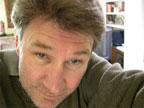 Them thar hills are alive with composers!… Like Larry Gaab out in the “wilds” of Chico, California (O.K., more valley than hill, but what the hey): family and marital counselor by day, experimental electroacoustic musician by any-other-time. Spare with biographical and other details, about all he’ll tell you is that he “blends treated acoustic sources and electronic instruments into works which are in part composed and in part improvised. The electronic instruments are invented and played live by various extended techniques.”
Them thar hills are alive with composers!… Like Larry Gaab out in the “wilds” of Chico, California (O.K., more valley than hill, but what the hey): family and marital counselor by day, experimental electroacoustic musician by any-other-time. Spare with biographical and other details, about all he’ll tell you is that he “blends treated acoustic sources and electronic instruments into works which are in part composed and in part improvised. The electronic instruments are invented and played live by various extended techniques.”